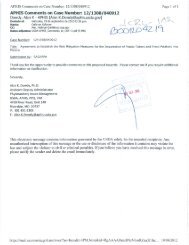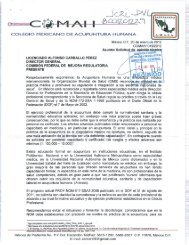Untitled
Untitled
Untitled
Create successful ePaper yourself
Turn your PDF publications into a flip-book with our unique Google optimized e-Paper software.
FAO/WHO Scientific Update on carbohydrates in<br />
human nutrition: introduction<br />
C Nishida 1 and F Martinez Nocito 2<br />
1 Department of Nutrition for Health and Development, World Health Organization (WHO), Geneva, Switzerland and 2 Nutrition and<br />
Consumer Protection Division, Food and Agriculture Organization of the United Nations (FAO), Rome, Italy<br />
European Journal of Clinical Nutrition (2007) 61 (Suppl 1), S1–S4; doi:10.1038/sj.ejcn.1602935<br />
Keywords: carbohydrates; human nutrition; expert consultation; FAO; WHO; recommendations<br />
Carbohydrates in human nutrition<br />
Since the 1950s, FAO and WHO have regularly held joint<br />
expert meetings to review the state of scientific knowledge<br />
on the role of various nutrients in the human diet, that is,<br />
proteins, fats and oils, and most vitamins, minerals and trace<br />
elements, to provide guidance on their requirements and<br />
recommended intakes (Weisell, 2002).<br />
The Joint FAO/WHO Expert Meeting on Carbohydrates in<br />
Human Nutrition held in Geneva from 16 to 26 September<br />
1979 was the first to focus on the topic of carbohydrates<br />
(FAO, 1980) and aimed to review the role of carbohydrates as<br />
determinants of human health and diseases. It was wide<br />
ranging in scope and addressed the important role of<br />
carbohydrates (1) as sources of energy contributing to the<br />
improvement of human nutritional status; (2) as determinants<br />
of the sensory qualities of foods, that is, flavour and<br />
texture and the acceptability of foods; (3) and their influence<br />
on the physiology and pathology of the large intestine,<br />
particularly through a deeper understanding of the role of<br />
dietary fibre; (4) as potential determinants of dental caries,<br />
obesity, cardiovascular disease and diabetes; and (5) as they<br />
relate to the nutrition of infants and young children,<br />
including the role of lactose and its inclusion in weaning<br />
foods.<br />
The Expert Meeting recognized, however, that it was<br />
inappropriate to focus on the nutritional effects of a single<br />
dietary component due to the wide range of carbohydrates<br />
consumed in the diet, and the fact that the overall<br />
Correspondence: Dr C Nishida, Department of Nutrition for Health and<br />
Development, World Health Organization (WHO), Avenue Appia 20, CH-1211<br />
Geneva 27, Switzerland.<br />
E-mail: nishidac@who.int<br />
European Journal of Clinical Nutrition (2007) 61 (Suppl 1), S1–S4<br />
& 2007 Nature Publishing Group All rights reserved 0954-3007/07 $30.00<br />
www.nature.com/ejcn<br />
nutritional consequences of any dietary pattern represents<br />
the integration of a wide range of interactive effects. Further<br />
studies were, therefore, considered to be necessary for<br />
understanding the interactions between carbohydrates and<br />
many other components of the diet to contribute to the<br />
improvement of the health and nutritional well-being of the<br />
world’s population (FAO, 1980).<br />
Eighteen years later, the Joint FAO/WHO Expert Consultation<br />
on Carbohydrates in Human Nutrition was convened in<br />
Rome from 14 to 18 April 1997 (FAO, 1998). Much progress<br />
was made in understanding the role that carbohydrates<br />
play in human nutrition and health. These included the<br />
following: (1) additional understanding of the role of dietary<br />
fibre, and in particular, its role in moderating the process of<br />
digestion in the small intestine and its potential as a major<br />
substrate for fermentation in the colon; (2) increased<br />
understanding of the diverse physiological roles that carbohydrates<br />
have, dependent upon the site, rate and extent of<br />
digestion and fermentation in the gut; (3) the potential<br />
of carbohydrates to enhance physical performance through<br />
glycogen loading; and (4) further understanding of the<br />
relationship between the diet and various noncommunicable<br />
diseases, including obesity, type II diabetes, coronary<br />
heart disease and some forms of cancer. Thus, it was<br />
again confirmed that carbohydrates are not only an energy<br />
source, but also have important impacts on the maintenance<br />
of health. The following recommendations were derived: (1)<br />
the terminology used to describe dietary carbohydrates<br />
should be based primarily on molecular size (degree of<br />
polymerization), with additional terms used to define<br />
nutritional groupings based on physiological properties;<br />
(2) the total carbohydrate in the diet should be measured<br />
as the sum of the individual carbohydrates rather than<br />
‘by difference’, as was also recommended by the 1979
















